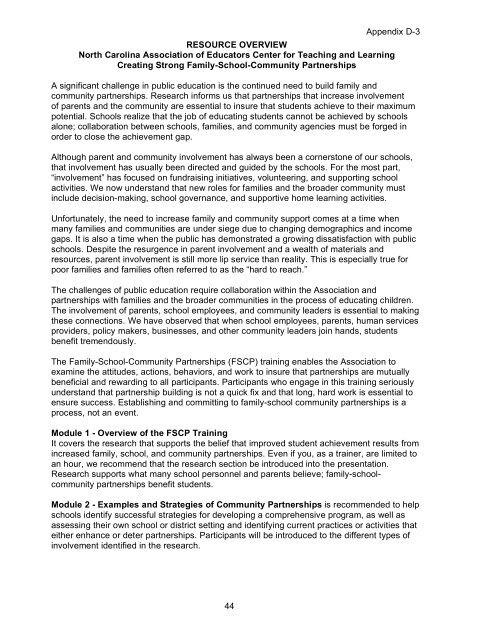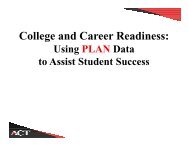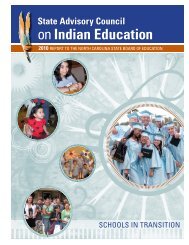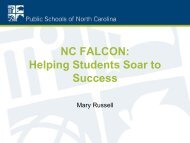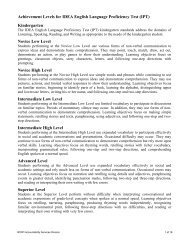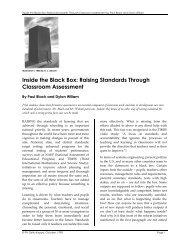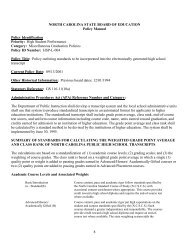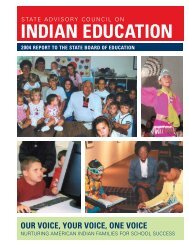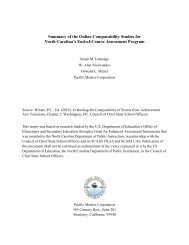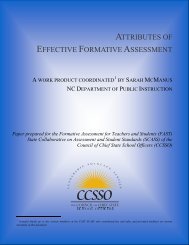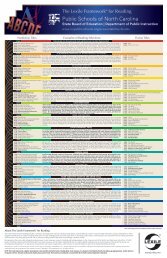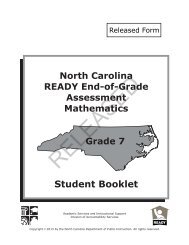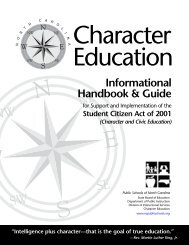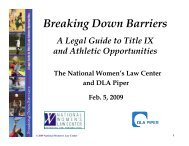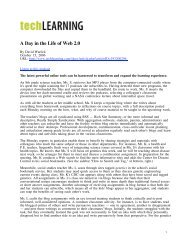Parent and Family Involvement - Public Schools of North Carolina
Parent and Family Involvement - Public Schools of North Carolina
Parent and Family Involvement - Public Schools of North Carolina
Create successful ePaper yourself
Turn your PDF publications into a flip-book with our unique Google optimized e-Paper software.
Appendix D-3<br />
RESOURCE OVERVIEW<br />
<strong>North</strong> <strong>Carolina</strong> Association <strong>of</strong> Educators Center for Teaching <strong>and</strong> Learning<br />
Creating Strong <strong>Family</strong>-School-Community Partnerships<br />
A significant challenge in public education is the continued need to build family <strong>and</strong><br />
community partnerships. Research informs us that partnerships that increase involvement<br />
<strong>of</strong> parents <strong>and</strong> the community are essential to insure that students achieve to their maximum<br />
potential. <strong>Schools</strong> realize that the job <strong>of</strong> educating students cannot be achieved by schools<br />
alone; collaboration between schools, families, <strong>and</strong> community agencies must be forged in<br />
order to close the achievement gap.<br />
Although parent <strong>and</strong> community involvement has always been a cornerstone <strong>of</strong> our schools,<br />
that involvement has usually been directed <strong>and</strong> guided by the schools. For the most part,<br />
“involvement” has focused on fundraising initiatives, volunteering, <strong>and</strong> supporting school<br />
activities. We now underst<strong>and</strong> that new roles for families <strong>and</strong> the broader community must<br />
include decision-making, school governance, <strong>and</strong> supportive home learning activities.<br />
Unfortunately, the need to increase family <strong>and</strong> community support comes at a time when<br />
many families <strong>and</strong> communities are under siege due to changing demographics <strong>and</strong> income<br />
gaps. It is also a time when the public has demonstrated a growing dissatisfaction with public<br />
schools. Despite the resurgence in parent involvement <strong>and</strong> a wealth <strong>of</strong> materials <strong>and</strong><br />
resources, parent involvement is still more lip service than reality. This is especially true for<br />
poor families <strong>and</strong> families <strong>of</strong>ten referred to as the “hard to reach.”<br />
The challenges <strong>of</strong> public education require collaboration within the Association <strong>and</strong><br />
partnerships with families <strong>and</strong> the broader communities in the process <strong>of</strong> educating children.<br />
The involvement <strong>of</strong> parents, school employees, <strong>and</strong> community leaders is essential to making<br />
these connections. We have observed that when school employees, parents, human services<br />
providers, policy makers, businesses, <strong>and</strong> other community leaders join h<strong>and</strong>s, students<br />
benefit tremendously.<br />
The <strong>Family</strong>-School-Community Partnerships (FSCP) training enables the Association to<br />
examine the attitudes, actions, behaviors, <strong>and</strong> work to insure that partnerships are mutually<br />
beneficial <strong>and</strong> rewarding to all participants. Participants who engage in this training seriously<br />
underst<strong>and</strong> that partnership building is not a quick fix <strong>and</strong> that long, hard work is essential to<br />
ensure success. Establishing <strong>and</strong> committing to family-school community partnerships is a<br />
process, not an event.<br />
Module 1 - Overview <strong>of</strong> the FSCP Training<br />
It covers the research that supports the belief that improved student achievement results from<br />
increased family, school, <strong>and</strong> community partnerships. Even if you, as a trainer, are limited to<br />
an hour, we recommend that the research section be introduced into the presentation.<br />
Research supports what many school personnel <strong>and</strong> parents believe; family-schoolcommunity<br />
partnerships benefit students.<br />
Module 2 - Examples <strong>and</strong> Strategies <strong>of</strong> Community Partnerships is recommended to help<br />
schools identify successful strategies for developing a comprehensive program, as well as<br />
assessing their own school or district setting <strong>and</strong> identifying current practices or activities that<br />
either enhance or deter partnerships. Participants will be introduced to the different types <strong>of</strong><br />
involvement identified in the research.<br />
44


